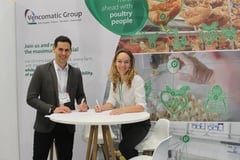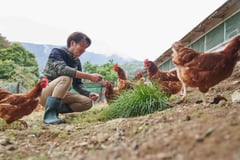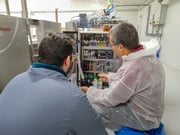"Most hens in a free range house don't even go outside, everything they need is in the system: food, drink and a place to sleep or lay an egg. But laying hens are very curious by nature, and once they have enjoyed an outdoor run they prefer to do so every day".
Gust Fleerakkers is Poultry Specialist at Vencomatic Group, he regularly receives questions from farmers about free range. Especially about the pros and cons: "Farmers like to see some life around their barn, so they can see how their chickens are doing. That is why they often throw some extra grain outside the system or outside the barn, so the hens don't sit too still. Isn't that why you have chosen for free range as a farmer? 
What are the advantages of free range?
"There is only one reason to switch to free range as a poultry farmer, and that is to give the hens more space. The eggs really don't taste any better, as some people think. Every poultry farmer is happy when they see happy chickens, it is even nicer when they walk freely outside and show healthy and natural behaviour. Believe me, that is really satisfying for a poultry farmer".
"You have to have enough ground available, because free range means more space per chicken. Farmers who switch to free range must be willing to invest, there must also be an earning model. That is, of course, part of the higher price; for a free-range egg, a poultry farmer receives two to three cents more. That is how they cover the higher costs.
And what are the disadvantages?
"Apart from the higher land costs, free range chickens are of course also lost to foxes and birds of prey. Outdoor scratching also increases the risk of infection from diseases such as bird flu, as there is an obligation to keep chickens indoors. You also have to invest in the area outside the barn; according to the guidelines, there have to be shelters and watering places".
"Many free-range farmers are also investing in a gravel path right next to the barn. Most chickens that go outside often stay close to the barn for fear. For example, they want to flee inside if an aeroplane comes over. As a result, the area around the barn is often a sandy plain; when it has rained there is a lot of mud. A gravel path prevents it from becoming a mess inside as well".
"Free range also makes demands on ventilation, many ventilation systems cannot handle the opening and closing of the hatches properly. This has led to the development of new climate systems such as equal pressure ventilation, the ECO Air Care ventilation system from Vencomatic Group is also a good example of this".
What do you need to pay attention to if you want to switch to free range as a poultry farmer?
"First you have to answer a number of questions: Is your current system adequate? And which system fits better? Above all, you have to look at the local regulations, in terms of the number of animals. In countries with a lot of space, such as England, the United States or Australia, switching to free range is easier because of the availability of land. Those are really 'free range countries'.
"If poultry farmers want to switch to free range, they usually do so in the existing house. They then contact us to see what they want and what is possible. For Vencomatic Group it doesn't matter which system they choose, we only give the best possible advice. And then they can give the chickens the space they need".







